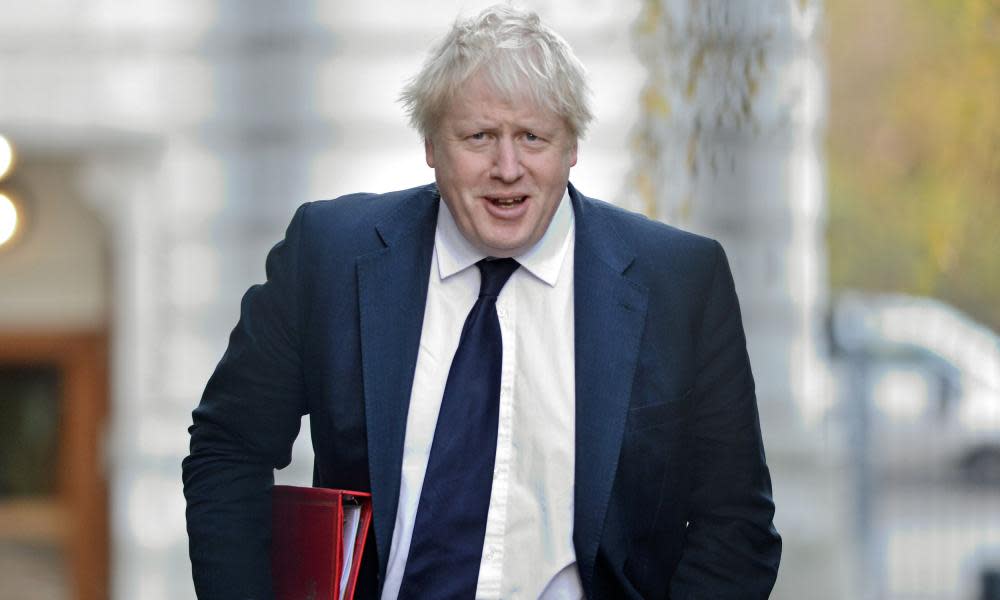Boris Johnson slams UK's infrastructure record, then proposes Channel bridge

Boris Johnson lambasted the UK’s record at delivering major infrastructure projects just days before raising the prospect of erecting a 22-mile bridge across the English Channel to better connect Britain to the rest of Europe.
The foreign secretary criticised systems of planning as being “extremely inimical at getting things done at pace and scale” and warned that Britain spent billions more than countries such as France on equivalent projects.
In an interview with the Guardian, he particularly hit out at failures in London, branding the capital’s Labour mayor as “Sadiq hashtag useless Khan” when it came to ambitious plans for new rail links.
Allies of the foreign secretary praised him for thinking big about what Britain could achieve.
But a Labour source in City Hall said it wouldn’t take lectures on infrastructure projects from Johnson, who they claimed had a staggering record of wasting taxpayer money on “vanity projects” such as £46m on the Garden Bridge without a single brick being laid.
“One thing as a country that we have to look at is the unbelievable cost and difficulty of delivering infrastructure projects. There is a Treasury study showing that we spend [significantly] more on big infrastructure pro-rata than the French,” Johnson said.
“Because we have companies that then have contractors and subcontractors ad infinitum ... and nobody taking ultimate responsibility.”
The minister – whose suggestion of a new UK-France link follows proposals for a four-runway airport on an island in the Thames estuary and a floating village in the Royal Docks – argued that steps could be taken to better seize the opportunities of ambitious projects.
“[We have] systems of planning and inquiry that are extremely inimical at getting things done at pace and at scale. We also have a total failure to think sequentially about our big infrastructure ambitions,” he said.
“Look at Crossrail. It is about to be finished this year – fantastic. Why aren’t we using all the people, all the training, all those skilled up to do Crossrail 2? Where is the Sadiq hashtag useless Khan on Crossrail 2? What is he doing on Crossrail 2?”
Johnson made the comments on Monday in response to a question about the collapse of Carillion. He said he wouldn’t comment on the individual woes of the outsourcing giant, but claimed there was a wider point about seizing ambitious opportunities.
The Treasury did produce a report in 2010 that highlighted stop-start investment, a lack of clarity and direction and the fragmentation of the construction industry with a significant shift towards subcontracting. It found that projects were more expensive in the UK than our “European peer group”, with the HS1 rail link around 25% more expensive than international equivalents.
However, officials were keen to stress that steps taken since then had saved around 15% between 2011 and 2014.
A Labour source in city hall said Johnson had been responsible for a series of wasteful projects, with critics adding the Emirates airline cable car, the new Routemaster bus and the ArcelorMittal Orbit sculpture in the Olympic park to the now abandoned Garden Bridge and his rejected “Boris Island airport”.
The source said Johnson ought to talk to the transport secretary, Chris Grayling, if he wanted faster movement on a second major rail link cutting across London, arguing that he was “wholly responsible for any delays to the project”.
James Murray, London’s deputy mayor for housing, responded on the Guardian Politics Weekly podcast, saying Labour had “inherited a mess” from Johnson in London and were sorting it out.
He claimed that Khan had been forced to “sieve out ill-considered schemes like the ‘floating village’ that were signed off when the former mayor had his eyes on No 10”.
“Like the previous mayor’s other vanity projects, the floating village was built on dodgy foundations and was quickly cancelled when Sadiq became mayor, who has focused his powers and resources instead on building the genuinely affordable homes Londoners need.”

 Yahoo News
Yahoo News 
